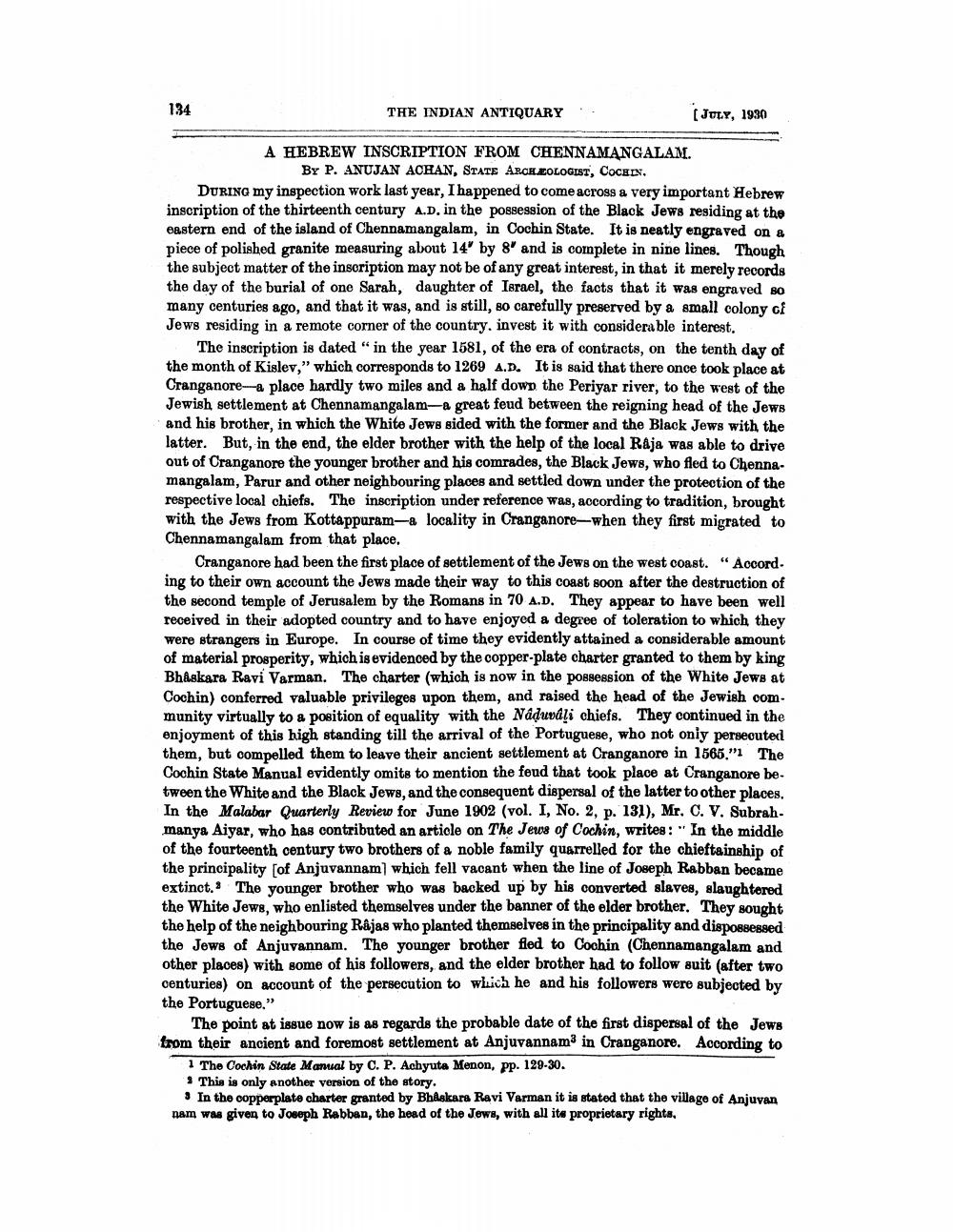________________
134
THE INDIAN ANTIQUARY ..
(JULY, 1930
A HEBREW INSCRIPTION FROM CHENNAMANGALAM.
By P. ANUJAN ACHAN, STATE ARCHEOLOGIST, COCEN. DURING my inspection work last year, I happened to come across a very important Hebrew inscription of the thirteenth century A.D. in the possession of the Black Jews residing at the eastern end of the island of Chennamangalam, in Cochin State. It is neatly engraved on a piece of polished granite measuring about 14' by 8' and is complete in nine lines. Though the subject matter of the inscription may not be of any great interest, in that it merely records the day of the burial of one Sarah, daughter of Israel, the facts that it was engraved so many centuries ago, and that it was, and is still, so carefully preserved by a small colony of Jews residing in a remote corner of the country, invest it with considerable interest.
The inscription is dated " in the year 1581, of the era of contracts, on the tenth day of the month of Kislev," which corresponds to 1269 A.D. It is said that there once took place at Cranganore--a place hardly two miles and a half down the Periyar river, to the west of the Jewish settlement at Chennamangalam-a great feud between the reigning head of the Jews and his brother, in which the White Jews sided with the former and the Black Jews with the latter. But, in the end, the elder brother with the help of the local Raja was able to drive out of Cranganore the younger brother and his comrades, the Black Jews, who fled to Chenna. mangalam, Parur and other neighbouring places and settled down under the protection of the respective local chiefs. The inscription under reference was, according to tradition, brought with the Jews from Kottappuram-a locality in Cranganore-when they first migrated to Chennamangalam from that place.
Cranganore had been the first place of settlement of the Jews on the west coast. “Accord. ing to their own account the Jews made their way to this coast soon after the destruction of the second temple of Jerusalem by the Romans in 70 A.D. They appear to have been well received in their adopted country and to have enjoyed a degree of toleration to which they were strangers in Europe. In course of time they evidently attained a considerable amount of material prosperity, which is evidenced by the copper-plate charter granted to them by king Bhaskara Ravi Varman. The charter (which is now in the possession of the White Jews at Cochin) conferred valuable privileges upon them, and raised the head of the Jewish community virtually to a position of equality with the Naduvaļi chiefs. They continued in the enjoyment of this high standing till the arrival of the Portuguese, who not oniy perseoute them, but compelled them to leave their ancient settlement at Cranganore in 1565."1 The Cochin State Manual evidently omits to mention the feud that took place at Cranganore be. tween the White and the Black Jews, and the consequent dispersal of the latter to other places. In the Malabar Quarterly Review for June 1902 (vol. I, No. 2, p. 131), Mr. C. V. Subrah. manya Aiyar, who has contributed an article on The Jews of Cochin, writes: " In the middle of the fourteenth century two brothers of a noble family quarrelled for the chieftainship of the principality [of Anjuvannam) which fell vacant when the line of Joseph Rabban became extinct. The younger brother who was backed up by his converted slaves, slaughtered the White Jews, who enlisted themselves under the banner of the elder brother. They sought the help of the neighbouring Rajas who planted themselves in the principality and dispossessed the Jews of Anjuvannam. The younger brother fled to Coohin (Chennamangalam and other places) with some of his followers, and the elder brother had to follow suit (after two centuries) on account of the persecution to which he and his followers were subjected by the Portuguese."
The point at issue now is as regards the probable date of the first dispersal of the Jews from their ancient and foremost settlement at Anjuvannam in Cranganore. According to
1 The Cochin State Manual by C. P. Achyuta Menon, pp. 129-30.
This is only another version of the story. 3 In the oopperplate charter granted by Bhaskara Ravi Varman it is stated that the village of Anjuvan nam was given to Joseph Rabban, the head of the Jews, with all ite proprietary rights,




